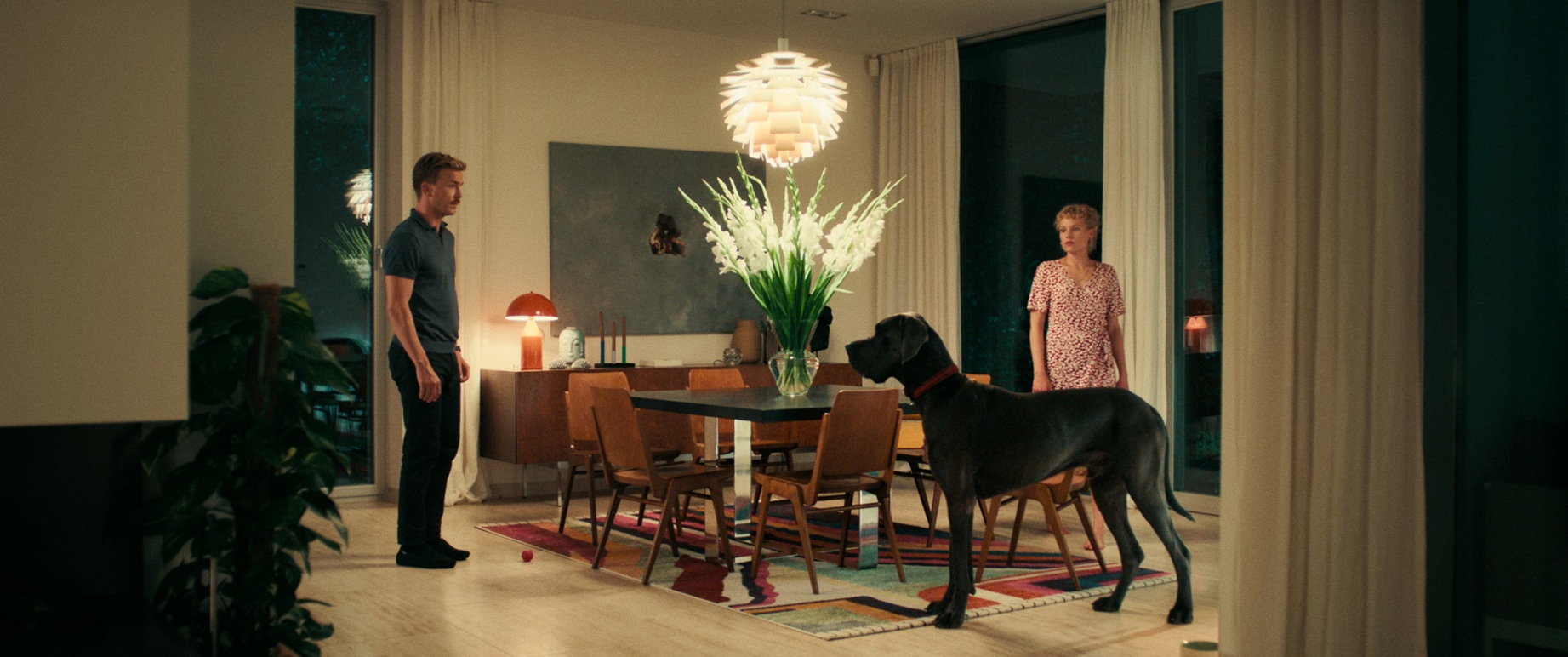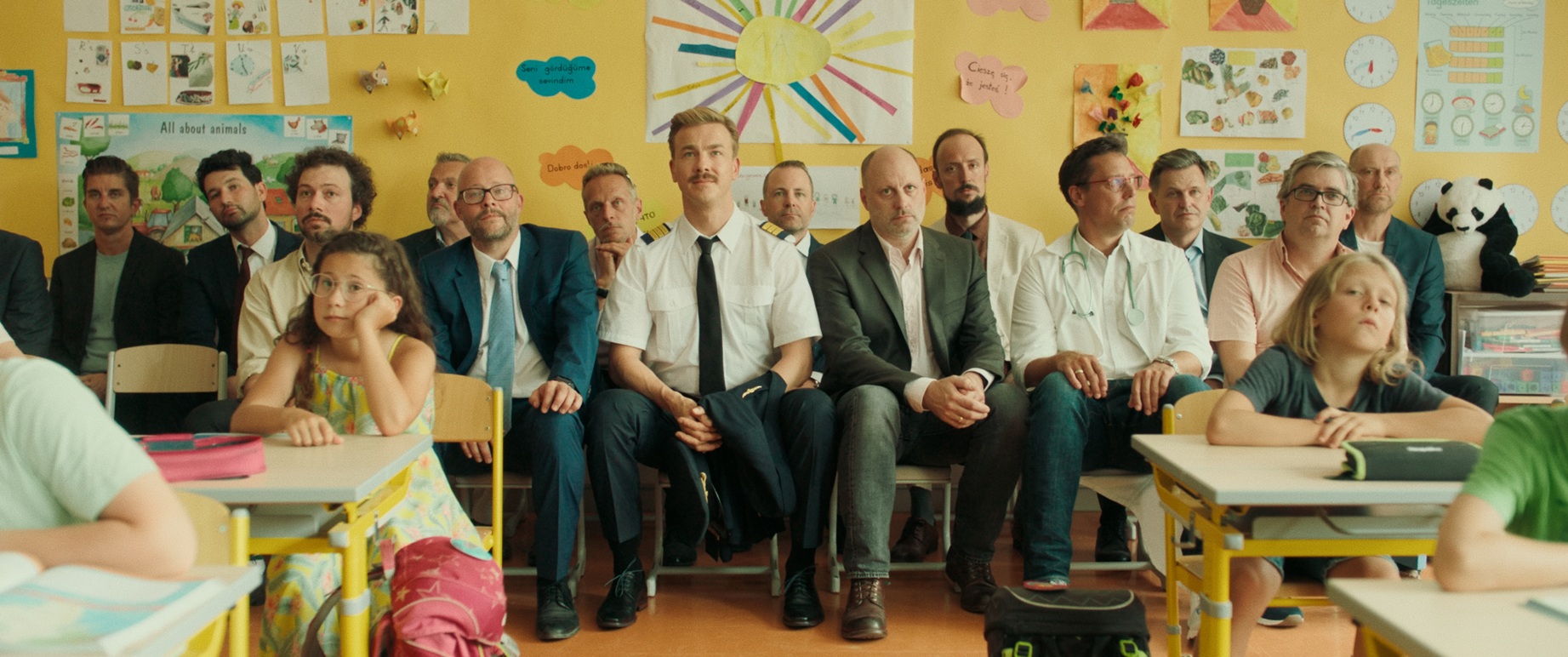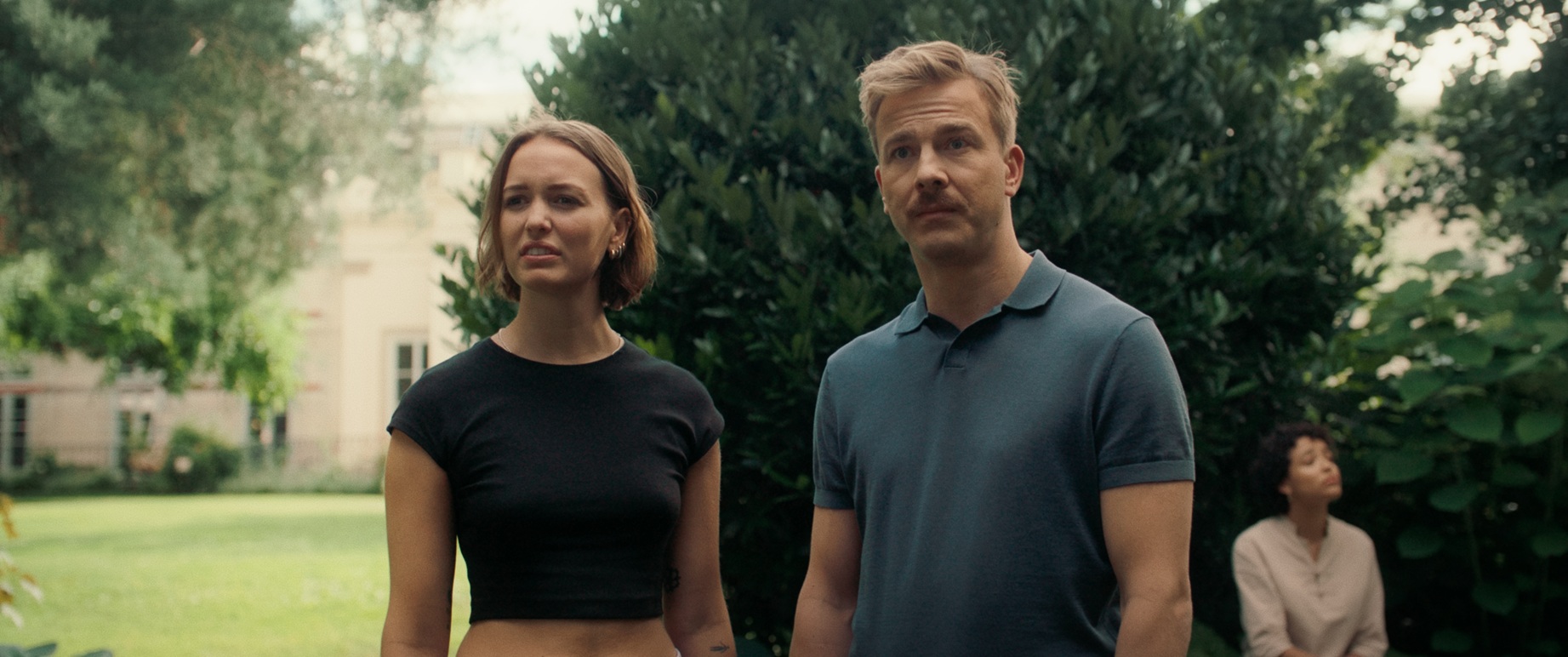‘Peacock’ seeks the nature of the self and our existence

“Peacock” (“Pfau – Bin ich echt?”) (2024 production/2025 release). Cast: Albrecht Schuch, Anton Noori, Julia Franz Richter, Salka Weber, Theresa Frostad Eggesbø, Maria Hofstätter, Branko Samarovski, Tilo Nest, Roland Silbernagl, Marlene Hauser, Doris Drechsel, Christopher Schärf. Director: Bernhard Wenger. Screenplay: Bernhard Wenger. Web site. Trailer.
In this age of increasingly untrustworthy AI, rampant fake news and unabashedly self-serving social media, it’s becoming ever more difficult for many of us to distinguish what’s “real” and what isn’t these days, almost as if we’re stuck in a frightening new Orwellian paradigm. That’s significant, not only for how we perceive existence, but even in terms of how we experience and respond to it. In fact, these circumstances might even be looked upon as a metaphysical or existential nightmare. But how do we cope with such circumstances? That’s the quest set to a lost soul seeking to find himself and understand the nature of his existence, as seen in the masterfully insightful new Austrian comedy-drama-satire, “Peacock” (“Pfau – Bin ich echt?”).
Given the increased sense of isolation that many of us are feeling these days, it’s easy to become lonely and lacking connection to our fellow human beings. This can be troubling under certain circumstances, such as family dynamics, romantic relationships and social interaction. But it can also lead to a lack of awareness of our own nature, leaving us wondering who we are and the place we occupy in our world. The resulting sense of utter detachment that can arise can be confusing and disconcerting, and answers for resolving these conditions can be highly elusive. So what are we to do?
Fortunately (or so it might at least seem), a solution can be found through the services of MyCompanion, a Vienna-based company that provides clients with professional stand-ins and impersonators to address their particular accompaniment needs, whatever those needs may be. If someone requires an escort for a social event, there’s a companion for that. The same is true if someone needs an individual to impersonate a long-absent family member for various types of occasions, such as reunions or milestone birthday or anniversary celebrations. It’s even possible to hire a companion to act as a stand-in parent at an elementary school career day presentation. All it takes is a credit card, a detailed description of what’s required and a willingness to trust the company’s representatives to live up to their assignments.

One of the company’s most adept companions – and one who is in very high demand based on the favorable ratings he receives on MyCompanion’s website – is Matthias (Albrecht Schuch). In the film’s opening act, viewers witness his versatility to assume a wide range of roles and to pull them off with complete authenticity, even under the most demanding and unusual circumstances. He’s so committed to his work that he’s even included a vast storage room in his home to house all of the costumes, props and other accoutrements that he needs to successfully perform his job. And it’s this kind of dedication that has produced a bevy of happy customers.
However, Matthias has become so proficient at his work that he’s begun to lose himself in it, unsure of where his job leaves off and his own reality begins. He even unwittingly responds to others in personal dealings with lines that he delivers while on job assignments, responses that often leave his closest acquaintances dumbfounded by his cryptic, out-of-context remarks.
That kind of inherent uncertainty and mystifying behavior carry a growing number of consequences. For instance, it has seriously impacted his relationship with his significant other, Sophia (Julia Franz Richter), who claims that she doesn’t know him anymore. On top of that, Matthias increasingly finds himself embroiled in dubiously complicated cases involving the likes of a bullied wife (Maria Hofstätter) who’s looking for coaching on how to argue more effectively with her overbearing husband (Branko Samarovski) and a wealthy senior (Tilo Nest) who seeks someone to stand in as his absent estranged son at his lavish 60th birthday soiree, an event tethered to an underlying self-serving agenda cooked up by the guest of honor. And, as the protagonist desperately searches for answers to better know his true self and to cope with these ever-maddening circumstances, he feels like he’s becoming hopelessly lost, frequently unable to discern or explain himself.
Matthias also unfairly becomes the unwitting object of conjecture, ridicule and blame from outsiders, including uninvolved third parties, who generally misinterpret conditions in which he is involved, seeing them through their own distorted (and often-shallow) filters, making them unconscious embodiments of unbridled pretention, much like superficial, proudly preening peacocks, as one character astutely observes. And, sadly, because Matthias doesn’t know himself, he’s ill-prepared to defend himself under circumstances like these, left to suffer whatever insults, indignities and accusations are hurled in his direction.

In turn, however, Matthias also employs a number of measures to try and get his life – and his self-awareness – back on track, but largely to no avail. He even resorts to calculated, underhanded tactics that illustrate just how desperate he has become as a result of these conditions. Such efforts might easily leave viewers wondering just how low he can sink to rectify matters, but those ploys intrinsically reflect how sad, anxious and despairing he is in trying to resolve difficult conditions for himself as easily as he appears to do for others. But, in the end, he sadly winds up no closer to finding suitable answers than when he launched into these ventures. And the longer this goes on, the more intractably confused he becomes. Is this the nature of the future that awaits him? Even a hired companion might not be able to help him out of this scenario at this point.
Ultimately, Matthias’s fate rests in the hands of his beliefs, as they dictate how his existence unfolds, a product of the conscious creation process, the philosophy that makes such outcomes possible. It’s unclear whether he has ever heard of this school of thought, but he appears to have an inkling about it (even if vague), that the answers to his problems reside with him, provided he can figure them out. Based on his actions, he seems to be on the right path, but he has yet to pull everything together, namely, that his beliefs are the key to discovering his authentic self and that his authentic self is the key determiner in shaping his reality. The question remains, though, will he be able to put together all of the pieces of this puzzle while he’s still capable of doing so? There’s no hard and fast deadline dictating this, but he is fast approaching a breaking point from which there may be no coming back, especially if he’s overcome by frustration, despair, anger or other comparable forces that prevent him from seeing the answers or from being willing to continue carrying on. It’s certainly within him – as it is for all of us – to devise a solution, but will he see it through or allow himself to give up? Again, it’s all a matter of our beliefs and what we do with them. This is important, because it could end up being a matter of one’s salvation, something Matthias had better figure out while he still has the chance.
Naturally, the starting point for this is an examination of our beliefs, given the central role they play in the manifestation process. In short, we become what we believe, for better or worse, depending on whatever beliefs underlie that thinking. Indeed, reality rests on this principle, its creation being a byproduct of what we put into it with our thoughts and intents, the stuff of which existence is essentially made. While some might consider this notion overly simplistic or naïve, it’s widely held by a range of proponents, including everyone from metaphysicians to scholars and philosophers to motivational speakers and coaches. And, with that kind of broad support, there must be something to it, so we would be wise not to dismiss it out of hand. Ironically, though, it’s something to which we seldom give much thought, and that can be our undoing.

That can be particularly critical for someone in Matthias’s shoes. He’s hamstrung by the fact that he’s become so detached from himself that he has difficulty grasping what he believes any more, a recipe for chaos, to be sure. And, given the overarching reach of existence itself, this affects him in all of the areas it touches, including his personal being, the prevailing conditions of his world, the people in his life and so on. If he’s unsure what to believe in each of these areas, he’s certain to be adrift and unable to find his way through life. If that’s not seen as a scary prospect, I don’t know what is.
To make matters worse, this lack of focus reverberates outward into essentially all aspects of his reality. That can be seen in how others perceive him, how they relate to him, and, in turn, how he reacts in response. But, with no existential rudder to guide him, how is Matthias supposed to know how to conduct himself, especially when he lacks healthy boundaries to prevent developments like his vocational life from uncontrollably bleeding over into his personal existence. Where do distinction and discernment come into play, in this and how can he separate the various components of his existence? What’s more, what actually constitutes the real Matthias? He’s apparently unclear about this, so it should come as no surprise that others around him feel the same way. Conditions like this thus bring new meaning to the notion of being up the creek without a paddle.
Because of the position these conditions occupy in Matthias’s mind and existence, it should come as no surprise that it gets reflected back to him in the same way through the other aspects that make up his world. Since he has trouble relating to himself, he consequently has trouble relating to those elements as well. As a result, his existence tends to become reduced to its most basic, simplistic, superficial levels, as evidenced, for example, by the ways others evaluate and perceive him. This can easily lead to misconceptions, unfair assessments, judgmentalism and all manner of erroneous assumptions. And those qualities, in turn, become extended into other areas of existence, such as the ways we communicate (or fail to do so) with one another. (If you doubt that, take a good, hard look at the state of social media these days, a condition metaphorically depicted with pinpoint accuracy in this film.)

Taken collectively, these considerations combine to paint a rather troubling picture of the state of our existence when it comes to knowing ourselves, understanding others and relating to the world around us. In their profound absence, we’ve come to crave connection and companionship, both in our own selves and with others. And, regrettably, these shortcomings all stem from a lack of having a solid grasp over our beliefs and how they can be employed to overcome these issues.
Thankfully, all of the foregoing considerations have been drawn into sharp focus in this film, providing us with a poignant examination of them and how they’re impacting us individually and collectively. It’s a potent cautionary tale – and a quietly stern warning – about what could happen to us if these problems are left unchecked. In fact, the film’s original German title – “Pfau – Bin ich echt?” – translates as “Peacock – Am I Real?” If any of us must ask ourselves such a question, that’s a sign we could be headed for real trouble – and at a very fundamental existential level. Our well-being and the very nature of our existence are potentially at stake if we fail to address these issues in earnest. We’d be wise to do so, too, if we don’t want to end up like Matthias.
In his superb debut feature, writer-director Bernhard Wenger deftly explores these mind-boggling scenarios with delicately applied dry wit and hilarious situational humor, showing more than telling what’s driving his narrative’s objectives. At the same time, though, there’s a deadly seriousness beneath the laughs, making insightful observations about the loss of identity and the consequential blurred lines distinguishing reality and fantasy that are growing ever more pronounced in our lives. In addition, there are scathing, symbolic, serious cautions to the dangers of social media toxicity and the undue, unsolicited judgmentalism that often tags along for the ride. Moreover, the filmmaker skillfully shows how all of these questionable, seemingly disparate elements ultimately tie together, leaving Matthias (not to mention the rest of us) with a noxious new form of existence that has us wondering about our very nature and what to believe about our fundamental sense of reality. “Peacock” is a smartly written, intelligently crafted offering from this gifted filmmaker, one that often reminds me of inventive, quirky pictures like director Ruben Östlund’s “The Square” (2017). It’s a picture that simultaneously entertains, enlightens and inspires in eye-opening ways – provided we leave ourselves open to those possibilities. And, in this day and age, we had better do that if we want to avoid consequences that, frankly, could be too troubling to think about. The film is currently playing in limited theatrical distribution and is likely to come to streaming in the near future.
Many of us are probably familiar with the expression “Proud as a peacock,” a saying often used to describe the display of beautiful plumage that these birds exhibit when their feathers are fully extended, a prime example of one of nature’s most self-satisfied, uninhibited show-offs. However, as an expression that was once generally looked upon benignly, its interpretation has changed somewhat – and not for the better – under prevailing conditions. As Ina so astutely observes in one scene when she spots a peacock while walking through the retreat center’s garden with Matthias, these ornithological parvenus are about as shallow as they come. And, unfortunately, as many of us have lost our sense of self and regressed to a more simplistic state of existence based on superficial appearances and a growing lack of self-awareness, the quality of our lives and existence has begun to pay the price. Indeed, are peacocks still worthy of this sort of emulation? And is this the path on which we wish to continue? Or will we wake up in time to become the discerning, fulfilled individuals we’re capable of being? To me, the choice should be obvious, but it won’t happen unless we believe in its veracity and take steps to implement it in the creation of our world. It’s something that doesn’t require the presence of a companion, either, an undertaking we must assume all on our own. Let’s hope we’re up to that challenge.
Copyright © 2025, by Brent Marchant. All rights reserved.



